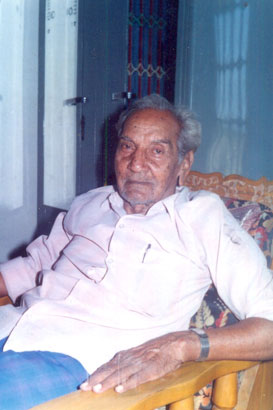Submergence village Chikhalda, Madhya Pradesh (M.P.)
“…they had announced that the dam is being built and the villages are going to get submerged…I don’t remember the year, but I remember that those from Towlai ashram became active in the movement…they went across all the villages and announced that the villages are going to get submerged and so on. They started collecting donations from all the villages for filing a Writ petition against this (Narmada Water Dispute Tribunal Award) … Now, after the hearing started (in the Supreme Court), it was decided that since this was an inter-state award, only the party states could file a Writ Petition and not the general public. Because of this, our petition was dismissed on the day of the first hearing itself, all the money we had collected for fees also went waste and the matter was dismissed… Then Medha Patkar took this issue up. While they were going around making inquiries, they came to know that these people were actively opposing the dam and had filed a Writ in the Court and so on, and that’s how they landed at the house of Parasmal (Karnavat). Parasmal spoke to them…After the talks, they decided that they would propagate the issue from village to village…and their work began from there…they had fixed a day for meetings, which used to take place in one of the temples at Rajghat. Every eighth day they would stay at the temple and Parasmal would also go there summoning people from nearby areas and taking them along where the speeches of these people and discussions would go on… When I went to Rajghat for the meeting and heard her (Medha Patkar’s) speech, I also felt that she is very learned and what she speaks is very logical and legally fair. I was deeply influenced by her words, and got so interested that whenever I would come to know about any meeting, I would go and attend. Attending those meetings influenced me so much that I became a follower of Medha Patkar… Since, I had been the sarpanch, I had some influence in the village, so gradually I started pulling the village towards the movement… my influence used to extend far and wide…to some extent people jumped into the movement for their self-interest also, thinking that if the construction of the dam stopped, then they could save themselves… All the official/government work, related to courts and offices, was my responsibility…whenever any activist was arrested, I would be the one to deal with it including getting them bail, getting them released, attending their court hearings, etc…I was allocated this responsibility since I had been the patwari and I had knowledge of the law…Whenever we used to participate in the agitations, police would arrest us and send us to jail…and I would have to go to secure the release of the prisoners everywhere…”, Patwari baba
Patwari baba hailed from the submergence village of Chikhalda in Madhya Pradesh, born in 1916, his interview is particularly important to understand the region that falls in the submergence of the Sardar Sarovar Project, the history of the opposition to the project and the many intricacies of a movement, how it grows and sustains itself. Patwari baba’s vast experience on account of his age and position of being the headman of a village falling in the submergence zone of SSP, lends special importance to his interview.

Interview Duration:
0:28:48
Language:
Hindi, Subtitles in English
Subtitles can be switched on and off by clicking ‘CC’ button at the bottom right of the video
Since this interview was recorded on a tape recorder in the year 2002 as digital recording was still not easily available in India, the sound of this recording is not as good as it is in the interviews I have recorded post 2006. However, the sound is clear and this interview is very important to listen to as it is of a person born in 1916 and covers a significant history around the Sardar Sarovar dam, the Narmada river and the struggle against the dam.